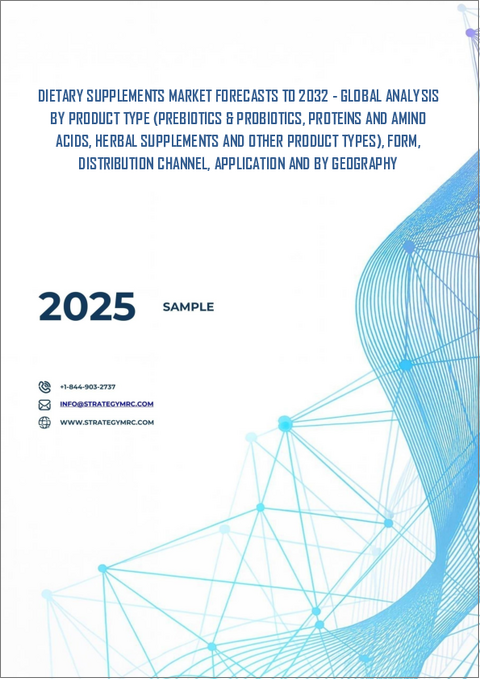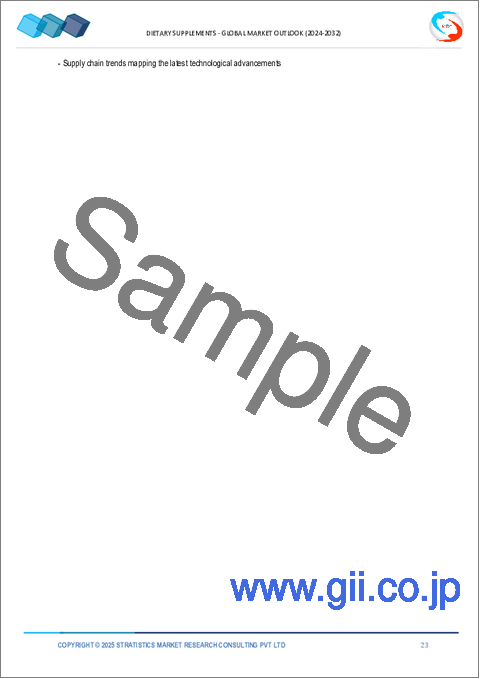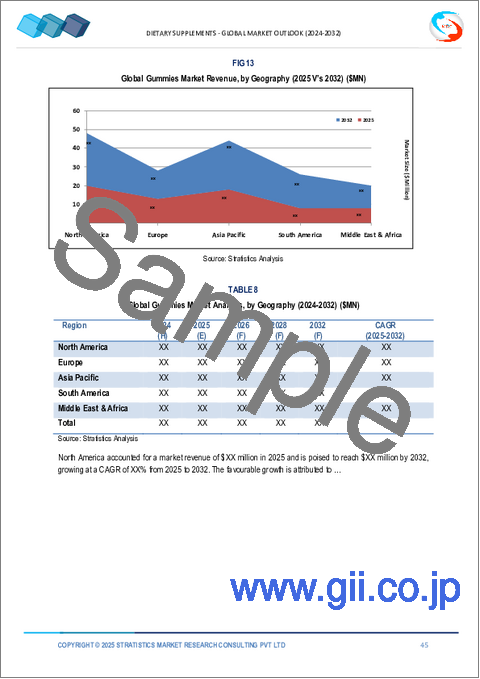|
|
市場調査レポート
商品コード
1423705
栄養補助食品市場の2030年までの予測:製品タイプ、形態、流通チャネル、用途別、地域別の世界分析Dietary Supplements Market Forecasts to 2030 - Global Analysis By Product Type (Prebiotics & Probiotics, Proteins and Amino Acids, Herbal Supplements and Other Product Types), Form, Distribution Channel, Application and By Geography |
||||||
カスタマイズ可能
|
|||||||
| 栄養補助食品市場の2030年までの予測:製品タイプ、形態、流通チャネル、用途別、地域別の世界分析 |
|
出版日: 2024年02月02日
発行: Stratistics Market Research Consulting
ページ情報: 英文 200+ Pages
納期: 2~3営業日
|
全表示
- 概要
- 図表
- 目次
Stratistics MRCによると、栄養補助食品の世界市場は2023年に1,820億4,000万米ドルを占め、予測期間中にCAGR 11.0%で成長し、2030年には3,779億4,000万米ドルに達すると予測されています。
栄養補助食品市場とは、ビタミン、ミネラル、ハーブ、アミノ酸、または食生活を補い、全体的な健康と幸福に貢献することを目的としたその他の物質を含む製品を生産・販売する産業を指します。これらのサプリメントは、錠剤、カプセル、粉末、液体など様々な形態があり、栄養不足に対処したり、特定の健康目標をサポートしたり、全体的な健康を増進したりするように設計されています。さらに、栄養補助食品は、骨の健康促進、免疫機能のサポート、加齢や子供や高齢者のような特定の層に関する懸念への対応など、専門的な分野でも役割を果たしています。
国立衛生研究所によると、栄養補助食品の売上は2019年に38%の割合で増加しました。栄養補助食品は、微量栄養素の欠乏を改善したり、十分な摂取量を維持したりするために使用できるため、健康な人々の数が増加しています。
高まる健康意識
健康全般を維持する上で栄養が果たす役割について個人の知識が深まるにつれ、予防ヘルスケアの実践が重視されるようになっています。消費者は、栄養補助食品を利用することで、自分の健康を増進し、潜在的な栄養不足に対処する方法を積極的に模索しています。栄養とライフスタイルを包括する健康への総合的なアプローチへの願望が、必須ビタミン、ミネラル、その他の有益な化合物を含むサプリメントへの需要に拍車をかけています。さらに、このような意識は、スポーツ栄養サプリメントを求める若年層から、加齢に伴う特定の健康懸念のサポートを目指す高齢者まで、さまざまな層にまで及んでいます。
標準化の欠如
用法、用量、配合、品質基準がサプリメントによってまちまちであることは、消費者にもヘルスケア専門家にも混乱を招きかねないです。統一されたガイドラインがなければ、製品の品質や効能にばらつきが生じる危険性があり、サプリメント摂取に対する標準化されたアプローチを確立することは困難です。明確な摂取量の推奨がないため、不適切な使用が行われ、副作用を引き起こしたり、サプリメントの有効性が低下したりする可能性があります。しかし、標準化の欠如は、包括的な調査や臨床試験を実施する能力の妨げとなり、様々なサプリメントの有効性と安全性を裏付ける確固たる科学的証拠の蓄積を妨げています。
製品処方の革新
業界における絶え間ない研究開発努力は、新規かつ先進的な製剤を生み出し、有効性、生物学的利用能、消費者への訴求力を向上させたサプリメントの創出を促進しています。こうした技術革新には、新しい成分の配合、送達方法の強化、特定の健康問題に対処するための標的ソリューションの開発などがしばしば含まれます。例えば、カプセル化技術の進歩や新規の生物活性化合物の利用は、栄養吸収を最適化したサプリメントの開発に貢献しています。
倫理的・環境的問題
植物成分の乱獲、疑わしい労働慣行、特定の調達方法に伴う環境悪化といった問題は、倫理的な配慮を提起します。消費者は、包装廃棄物や二酸化炭素排出量など、サプリメント製造が環境に与える影響について、より強く意識するようになっています。責任を持って調達された環境に優しいサプリメントへの需要は、サプライチェーン全体を通じて持続可能な慣行を採用するよう業界に課しています。
COVID-19の影響:
サプライチェーン、製造、流通チャネルにおける混乱は、業界に課題を突きつけています。閉鎖、経済の不確実性、消費者の消費パターンの変化が個人の購買行動に影響を与え、市場力学全体に影響を与えています。さらに、パンデミックは、栄養補助食品の入手可能性と安全性を確保する上で、弾力性と透明性のあるサプライチェーンの重要性を浮き彫りにしました。長期的な影響としては、栄養補助食品市場における適応性とイノベーションの必要性と相まって、健康とウェルネスへの重点が高まることが考えられます。
予測期間中、子供向けサプリメント分野が最大となる見込み
子どもの全体的な健康のために栄養が重要であるという保護者の意識が高まっていることから、子ども向けサプリメント分野は予測期間中に最大規模になると予想されます。子供の健康と発育に対する懸念が高まるにつれ、子供に必要なビタミンやミネラルを確実に摂取させるために栄養補助食品を利用する親が増えています。グミやチュアブル錠など、革新的で魅力的な剤形が急増し、子どもたちがサプリメントを摂取しやすくなっています。さらに、小児科医やヘルスケア専門家は、子どもの食生活における栄養不足に対処するため、栄養補助食品の使用を積極的に支持しています。
予測期間中にCAGRが最も高くなると予想されるのは心臓の健康分野です。
心臓の健康分野は、予測期間中にCAGRが最も高くなると予想されます。健康な心臓を維持するための栄養の役割に対する認識が高まるにつれ、オメガ3脂肪酸、コエンザイムQ10、植物ステロールなど、心臓血管によいことで知られる成分を含む栄養補助食品に注目が集まっています。さらに、座りっぱなしのライフスタイルや食生活の乱れが、心臓によいライフスタイルを補完するサプリメントの需要に拍車をかけています。さらに、メーカー各社は、ヘルスケア専門家の支持を受け、心臓血管の健康を促進することをターゲットとした特殊な製剤を発売することで対応しています。
最大のシェアを占める地域
推定期間を通じて、アジア太平洋地域が市場で最大のシェアを占めています。急速な都市化、ライフスタイルの変化、予防ヘルスケアへの関心の高まりにより、栄養補助食品の重要性に対する認識が高まっています。可処分所得の増加により、中間所得層が増加し、栄養補助食品を含む健康・ウェルネス製品への投資が可能になった。さらに、アーユルヴェーダや中国伝統医学などの伝統的な慣習が、この地域におけるハーブや天然サプリメントの受容に貢献しています。
CAGRが最も高い地域:
アジア太平洋地域は、予測期間中に有利な成長を遂げると推定されます。規制の明確化と各国政府による厳格な品質基準の強化が、栄養補助食品の安全性と有効性に対する消費者の信頼を高めています。規制機関は、製品のラベリング、製造慣行、成分の安全性に関する明確なガイドラインの確立に積極的に取り組んでおり、製品の品質と真正性に関する懸念に対処しています。さらに、政府は公衆衛生と健康維持を優先するため、栄養補助食品業界の研究開発イニシアチブを支援しています。
無料のカスタマイズサービス:
本レポートをご購読のお客様には、以下の無料カスタマイズオプションのいずれかをご利用いただけます:
- 企業プロファイル
- 追加市場プレーヤーの包括的プロファイリング(3社まで)
- 主要企業のSWOT分析(3社まで)
- 地域セグメンテーション
- 顧客の関心に応じた主要国の市場推計・予測・CAGR(注:フィージビリティチェックによる)
- 競合ベンチマーキング
- 製品ポートフォリオ、地理的プレゼンス、戦略的提携に基づく主要企業のベンチマーキング
目次
第1章 エグゼクティブサマリー
第2章 序文
- 概要
- ステークホルダー
- 調査範囲
- 調査手法
- データマイニング
- データ分析
- データ検証
- 調査アプローチ
- 調査ソース
- 1次調査ソース
- 2次調査ソース
- 前提条件
第3章 市場動向分析
- 促進要因
- 抑制要因
- 機会
- 脅威
- 製品分析
- アプリケーション分析
- 新興市場
- 新型コロナウイルス感染症(COVID-19)の影響
第4章 ポーターのファイブフォース分析
- 供給企業の交渉力
- 買い手の交渉力
- 代替品の脅威
- 新規参入業者の脅威
- 競争企業間の敵対関係
第5章 世界の栄養補助食品市場:製品タイプ別
- プレバイオティクスとプロバイオティクス
- タンパク質とアミノ酸
- ハーブサプリメント
- ビタミンとミネラル
- 美容とアンチエイジングのサプリメント
- 小児用サプリメント
- オメガ3脂肪酸
- シニア向け健康サプリメント
- 特殊サプリメント
- スポーツ栄養学
- 体重管理
- その他の製品タイプ
第6章 世界の栄養補助食品市場:形態別
- 液体
- ソフトジェル
- グミ
- 粉末
- その他の形式
第7章 世界の栄養補助食品市場:流通チャネル別
- オンライン小売チャネル
- スーパーマーケット/ハイパーマーケット
- 薬局・ドラッグストア
第8章 世界の栄養補助食品市場:用途別
- 肌/髪/爪
- 糖尿病
- 心臓の健康
- 胃腸の健康
- エネルギーと体重の管理
- 骨と関節の健康
- 一般的な健康
- その他の用途
第9章 世界の栄養補助食品市場:地域別
- 北米
- 米国
- カナダ
- メキシコ
- 欧州
- ドイツ
- 英国
- イタリア
- フランス
- スペイン
- その他欧州
- アジア太平洋地域
- 日本
- 中国
- インド
- オーストラリア
- ニュージーランド
- 韓国
- その他アジア太平洋地域
- 南米
- アルゼンチン
- ブラジル
- チリ
- その他南米
- 中東とアフリカ
- サウジアラビア
- アラブ首長国連邦
- カタール
- 南アフリカ
- その他中東とアフリカ
第10章 主な発展
- 契約、パートナーシップ、コラボレーション、合弁事業
- 買収と合併
- 新製品の発売
- 事業拡大
- その他の主要戦略
第11章 企業プロファイル
- Bayer AG
- Amway Corporation
- Herbalife Nutrition
- Pfizer Inc
- Abbott Laboratories
- Haleon Plc
- Suntory Holdings Ltd
- Otsuka Holdings Co. Ltd
- Glanbia PLC
- The Bountiful Company
- Bionova Lifesciences
- Carlyle Group
- Arkopharma Laboratoires Pharmaceutiques
List of Tables
- Table 1 Global Dietary Supplements Market Outlook, By Region (2021-2030) ($MN)
- Table 2 Global Dietary Supplements Market Outlook, By Product Type (2021-2030) ($MN)
- Table 3 Global Dietary Supplements Market Outlook, By Prebiotics & Probiotics (2021-2030) ($MN)
- Table 4 Global Dietary Supplements Market Outlook, By Proteins and Amino Acids (2021-2030) ($MN)
- Table 5 Global Dietary Supplements Market Outlook, By Herbal Supplements (2021-2030) ($MN)
- Table 6 Global Dietary Supplements Market Outlook, By Vitamins & Minerals (2021-2030) ($MN)
- Table 7 Global Dietary Supplements Market Outlook, By Beauty and Anti-Aging Supplements (2021-2030) ($MN)
- Table 8 Global Dietary Supplements Market Outlook, By Children's Supplements (2021-2030) ($MN)
- Table 9 Global Dietary Supplements Market Outlook, By Omega-3 Fatty Acids (2021-2030) ($MN)
- Table 10 Global Dietary Supplements Market Outlook, By Senior Health Supplements (2021-2030) ($MN)
- Table 11 Global Dietary Supplements Market Outlook, By Specialty Supplements (2021-2030) ($MN)
- Table 12 Global Dietary Supplements Market Outlook, By Sports Nutrition (2021-2030) ($MN)
- Table 13 Global Dietary Supplements Market Outlook, By Weight Management (2021-2030) ($MN)
- Table 14 Global Dietary Supplements Market Outlook, By Other Product Types (2021-2030) ($MN)
- Table 15 Global Dietary Supplements Market Outlook, By Form (2021-2030) ($MN)
- Table 16 Global Dietary Supplements Market Outlook, By Liquids (2021-2030) ($MN)
- Table 17 Global Dietary Supplements Market Outlook, By Softgels (2021-2030) ($MN)
- Table 18 Global Dietary Supplements Market Outlook, By Gummies (2021-2030) ($MN)
- Table 19 Global Dietary Supplements Market Outlook, By Powders (2021-2030) ($MN)
- Table 20 Global Dietary Supplements Market Outlook, By Other Forms (2021-2030) ($MN)
- Table 21 Global Dietary Supplements Market Outlook, By Distribution Channel (2021-2030) ($MN)
- Table 22 Global Dietary Supplements Market Outlook, By Online Retail Channels (2021-2030) ($MN)
- Table 23 Global Dietary Supplements Market Outlook, By Supermarkets/Hypermarkets (2021-2030) ($MN)
- Table 24 Global Dietary Supplements Market Outlook, By Pharmacies and Drug Stores (2021-2030) ($MN)
- Table 25 Global Dietary Supplements Market Outlook, By Application (2021-2030) ($MN)
- Table 26 Global Dietary Supplements Market Outlook, By Skin/Hair/Nails (2021-2030) ($MN)
- Table 27 Global Dietary Supplements Market Outlook, By Diabetes (2021-2030) ($MN)
- Table 28 Global Dietary Supplements Market Outlook, By Cardiac Health (2021-2030) ($MN)
- Table 29 Global Dietary Supplements Market Outlook, By Gastrointestinal Health (2021-2030) ($MN)
- Table 30 Global Dietary Supplements Market Outlook, By Energy & Weight Management (2021-2030) ($MN)
- Table 31 Global Dietary Supplements Market Outlook, By Bone & Joint Health (2021-2030) ($MN)
- Table 32 Global Dietary Supplements Market Outlook, By General Health (2021-2030) ($MN)
- Table 33 Global Dietary Supplements Market Outlook, By Other Applications (2021-2030) ($MN)
Note: Tables for North America, Europe, APAC, South America, and Middle East & Africa Regions are also represented in the same manner as above.
According to Stratistics MRC, the Global Dietary Supplements Market is accounted for $182.04 billion in 2023 and is expected to reach $377.94 billion by 2030 growing at a CAGR of 11.0% during the forecast period. The dietary supplements market refers to the industry that produces and markets products containing vitamins, minerals, herbs, amino acids, or other substances intended to supplement the diet and contribute to overall health and well-being. These supplements come in various forms, such as pills, capsules, powders, and liquids, and are designed to address nutritional deficiencies, support specific health goals, or enhance overall wellness. Additionally, dietary supplements play a role in specialized areas such as promoting bone health, supporting immune function, and addressing concerns related to aging or specific demographic groups like children or seniors.
According to the National Institute of Health, the sales of dietary supplements increased at a rate of 38% in 2019. Growing numbers of healthy people are taking dietary supplements as they can be used to correct micronutrient deficiency or maintain an adequate intake.
Market Dynamics:
Driver:
Growing health awareness
As individuals become more informed about the role of nutrition in maintaining overall health, there is a heightened emphasis on preventive healthcare practices. Consumers are proactively seeking ways to enhance their well-being and address potential nutritional deficiencies through the use of dietary supplements. The desire for a holistic approach to health, encompassing nutrition and lifestyle, has fueled the demand for supplements containing essential vitamins, minerals, and other beneficial compounds. Moreover, this awareness extends to various demographic groups, from young adults seeking sports nutrition supplements to seniors aiming to support specific health concerns associated with aging.
Restraint:
Lack of standardization
Variability in dosages, formulations, and quality standards across different supplements can create confusion for consumers and healthcare professionals alike. Without uniform guidelines, there is a risk of inconsistent product quality and efficacy, making it challenging to establish a standardized approach to supplement consumption. The absence of clear dosing recommendations can lead to improper use, potentially causing adverse effects or diminishing the perceived effectiveness of supplements. However, the lack of standardization hampers the ability to conduct comprehensive research and clinical trials, hindering the accumulation of robust scientific evidence supporting the efficacy and safety of various supplements.
Opportunity:
Innovations in product formulations
Continuous research and development efforts within the industry lead to novel and advanced formulations, fostering the creation of supplements with improved efficacy, bioavailability, and consumer appeal. These innovations often involve the incorporation of new ingredients, enhanced delivery methods, and the development of targeted solutions to address specific health concerns. For instance, advancements in encapsulation technologies and the utilization of novel bioactive compounds contribute to the creation of supplements with optimized nutrient absorption.
Threat:
Ethical and environmental concerns
Issues such as overharvesting of botanical ingredients, questionable labor practices, and environmental degradation associated with certain sourcing methods raise ethical considerations. Consumers are becoming more conscious of the environmental impact of supplement production, including packaging waste and carbon footprints. The demand for responsibly sourced and eco-friendly supplements challenges the industry to adopt sustainable practices throughout the supply chain.
Covid-19 Impact:
Disruptions in the supply chain, manufacturing, and distribution channels have posed challenges for the industry. Lockdowns, economic uncertainties, and shifts in consumer spending patterns have influenced the purchasing behavior of individuals, impacting overall market dynamics. Additionally, the pandemic has highlighted the importance of a resilient and transparent supply chain in ensuring the availability and safety of dietary supplements. The long-term impact will likely involve an increased emphasis on health and wellness, coupled with a need for adaptability and innovation within the dietary supplements market.
The children's supplements segment is expected to be the largest during the forecast period
Children's supplements segment is expected to be the largest during the forecast period due to growing awareness among parents about the importance of nutrition for their children's overall well-being. As concerns about children's health and development rise, parents are increasingly turning to dietary supplements to ensure their kids receive essential vitamins and minerals. The market has responded with a surge in innovative and appealing formulations, such as gummies and chewable tablets, making it easier for children to consume these supplements. Additionally, pediatricians and healthcare professionals are actively endorsing the use of dietary supplements to address nutritional gaps in children's diets.
The cardiac health segment is expected to have the highest CAGR during the forecast period
Cardiac health segment is expected to have the highest CAGR during the forecast period. With rising awareness about the role of nutrition in maintaining a healthy heart, individuals are turning to dietary supplements containing ingredients like omega-3 fatty acids, Coenzyme Q10, and plant sterols known for their cardiovascular benefits. Moreover, a sedentary lifestyle and poor dietary habits have spurred the demand for supplements that can complement heart-healthy lifestyles. Moreover, manufacturers are responding by introducing specialized formulations targeted at promoting cardiovascular well-being, endorsed by healthcare professionals.
Region with largest share:
Asia Pacific region commanded the largest share of the market throughout the extrapolated period. Rapid urbanization, changing lifestyles, and an increasing focus on preventive healthcare have led to a heightened awareness of the importance of nutritional supplementation. Growing disposable incomes have enabled a rising middle class to invest in health and wellness products, including dietary supplements. Moreover, traditional practices such as Ayurveda and Traditional Chinese Medicine have contributed to the acceptance of herbal and natural supplements in the region.
Region with highest CAGR:
Asia Pacific region is estimated to witness lucrative growth over the projected period. Increased regulatory clarity and stringent quality standards enforced by governments across the region have bolstered consumer confidence in the safety and efficacy of dietary supplements. Regulatory bodies are actively working to establish clear guidelines for product labeling, manufacturing practices, and ingredient safety, addressing concerns related to product quality and authenticity. Furthermore, as governments prioritize public health and wellness, they are also supporting research and development initiatives in the dietary supplements industry.
Key players in the market
Some of the key players in Dietary Supplements market include Bayer AG, Amway Corporation, Herbalife Nutrition, Pfizer Inc, Abbott Laboratories, Haleon Plc, Suntory Holdings Ltd, Otsuka Holdings Co. Ltd, Glanbia PLC, The Bountiful Company, Bionova Lifesciences, Carlyle Group and Arkopharma Laboratoires Pharmaceutiques.
Key Developments:
In September 2022, Abbott launched a brand-new Ensure formulation with HMB. As a science-based nutritional supplement, the new Ensure contains 32 essential nutrients such as protein, calcium, and vitamin D to help improve muscle and bone strength. It contains HMB or hydroxy-methyl butyrate, a new ingredient that helps counteract muscle loss and increases the strength and power of the body.
In August 2022, Optimum Nutrition, a Glanbia Performance Nutrition brand, launched its brand-new Gold Standard Protein Shake. The new drink has two flavors: chocolate and vanilla. Each serving contains 24 grams of protein.
In March 2022, PharmaNutrics launched five different dietary supplements in the United States. SerotomixPlus, GlucanPlus, Gaba 600, EnergixPlux, and CurcumixPlux serve different purposes for fatigue, stress, musculoskeleton, and anti-inflammatory support.
Product Types Covered:
- Prebiotics & Probiotics
- Proteins and Amino Acids
- Herbal Supplements
- Vitamins & Minerals
- Beauty and Anti-Aging Supplements
- Children's Supplements
- Omega-3 Fatty Acids
- Senior Health Supplements
- Specialty Supplements
- Sports Nutrition
- Weight Management
- Other Product Types
Forms Covered:
- Liquids
- Softgels
- Gummies
- Powders
- Other Forms
Distribution Channels Covered:
- Online Retail Channels
- Supermarkets/Hypermarkets
- Pharmacies and Drug Stores
Applications Covered:
- Skin/Hair/Nails
- Diabetes
- Cardiac Health
- Gastrointestinal Health
- Energy & Weight Management
- Bone & Joint Health
- General Health
- Other Applications
Regions Covered:
- North America
- US
- Canada
- Mexico
- Europe
- Germany
- UK
- Italy
- France
- Spain
- Rest of Europe
- Asia Pacific
- Japan
- China
- India
- Australia
- New Zealand
- South Korea
- Rest of Asia Pacific
- South America
- Argentina
- Brazil
- Chile
- Rest of South America
- Middle East & Africa
- Saudi Arabia
- UAE
- Qatar
- South Africa
- Rest of Middle East & Africa
What our report offers:
- Market share assessments for the regional and country-level segments
- Strategic recommendations for the new entrants
- Covers Market data for the years 2021, 2022, 2023, 2026, and 2030
- Market Trends (Drivers, Constraints, Opportunities, Threats, Challenges, Investment Opportunities, and recommendations)
- Strategic recommendations in key business segments based on the market estimations
- Competitive landscaping mapping the key common trends
- Company profiling with detailed strategies, financials, and recent developments
- Supply chain trends mapping the latest technological advancements
Free Customization Offerings:
All the customers of this report will be entitled to receive one of the following free customization options:
- Company Profiling
- Comprehensive profiling of additional market players (up to 3)
- SWOT Analysis of key players (up to 3)
- Regional Segmentation
- Market estimations, Forecasts and CAGR of any prominent country as per the client's interest (Note: Depends on feasibility check)
- Competitive Benchmarking
- Benchmarking of key players based on product portfolio, geographical presence, and strategic alliances
Table of Contents
1 Executive Summary
2 Preface
- 2.1 Abstract
- 2.2 Stake Holders
- 2.3 Research Scope
- 2.4 Research Methodology
- 2.4.1 Data Mining
- 2.4.2 Data Analysis
- 2.4.3 Data Validation
- 2.4.4 Research Approach
- 2.5 Research Sources
- 2.5.1 Primary Research Sources
- 2.5.2 Secondary Research Sources
- 2.5.3 Assumptions
3 Market Trend Analysis
- 3.1 Introduction
- 3.2 Drivers
- 3.3 Restraints
- 3.4 Opportunities
- 3.5 Threats
- 3.6 Product Analysis
- 3.7 Application Analysis
- 3.8 Emerging Markets
- 3.9 Impact of Covid-19
4 Porters Five Force Analysis
- 4.1 Bargaining power of suppliers
- 4.2 Bargaining power of buyers
- 4.3 Threat of substitutes
- 4.4 Threat of new entrants
- 4.5 Competitive rivalry
5 Global Dietary Supplements Market, By Product Type
- 5.1 Introduction
- 5.2 Prebiotics & Probiotics
- 5.3 Proteins and Amino Acids
- 5.4 Herbal Supplements
- 5.5 Vitamins & Minerals
- 5.6 Beauty and Anti-Aging Supplements
- 5.7 Children's Supplements
- 5.8 Omega-3 Fatty Acids
- 5.9 Senior Health Supplements
- 5.10 Specialty Supplements
- 5.11 Sports Nutrition
- 5.12 Weight Management
- 5.13 Other Product Types
6 Global Dietary Supplements Market, By Form
- 6.1 Introduction
- 6.2 Liquids
- 6.3 Softgels
- 6.4 Gummies
- 6.5 Powders
- 6.6 Other Forms
7 Global Dietary Supplements Market, By Distribution Channel
- 7.1 Introduction
- 7.2 Online Retail Channels
- 7.3 Supermarkets/Hypermarkets
- 7.4 Pharmacies and Drug Stores
8 Global Dietary Supplements Market, By Application
- 8.1 Introduction
- 8.2 Skin/Hair/Nails
- 8.3 Diabetes
- 8.4 Cardiac Health
- 8.5 Gastrointestinal Health
- 8.6 Energy & Weight Management
- 8.7 Bone & Joint Health
- 8.8 General Health
- 8.9 Other Applications
9 Global Dietary Supplements Market, By Geography
- 9.1 Introduction
- 9.2 North America
- 9.2.1 US
- 9.2.2 Canada
- 9.2.3 Mexico
- 9.3 Europe
- 9.3.1 Germany
- 9.3.2 UK
- 9.3.3 Italy
- 9.3.4 France
- 9.3.5 Spain
- 9.3.6 Rest of Europe
- 9.4 Asia Pacific
- 9.4.1 Japan
- 9.4.2 China
- 9.4.3 India
- 9.4.4 Australia
- 9.4.5 New Zealand
- 9.4.6 South Korea
- 9.4.7 Rest of Asia Pacific
- 9.5 South America
- 9.5.1 Argentina
- 9.5.2 Brazil
- 9.5.3 Chile
- 9.5.4 Rest of South America
- 9.6 Middle East & Africa
- 9.6.1 Saudi Arabia
- 9.6.2 UAE
- 9.6.3 Qatar
- 9.6.4 South Africa
- 9.6.5 Rest of Middle East & Africa
10 Key Developments
- 10.1 Agreements, Partnerships, Collaborations and Joint Ventures
- 10.2 Acquisitions & Mergers
- 10.3 New Product Launch
- 10.4 Expansions
- 10.5 Other Key Strategies
11 Company Profiling
- 11.1 Bayer AG
- 11.2 Amway Corporation
- 11.3 Herbalife Nutrition
- 11.4 Pfizer Inc
- 11.5 Abbott Laboratories
- 11.6 Haleon Plc
- 11.7 Suntory Holdings Ltd
- 11.8 Otsuka Holdings Co. Ltd
- 11.9 Glanbia PLC
- 11.10 The Bountiful Company
- 11.11 Bionova Lifesciences
- 11.12 Carlyle Group
- 11.13 Arkopharma Laboratoires Pharmaceutiques






